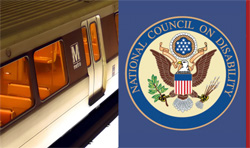
On May 4, 2015 the National Council on Disability (NCD) published a major report entitled Transportation Update: Where We’ve Gone and What We’ve Learned authored by Marilyn Golden, DREDF Senior Policy Analyst. The Update is a comprehensive analysis of surface transportation in the United States today, covering bus, train, and paratransit systems, enforcement, rural transit and fixed route deviation, key policy developments in ADA transportation, commercial driver’s license rules, public rights-of-way, and privately-funded transportation, including accessible taxis and transportation network companies (TNCs).
Of particular importance:
- Amtrak, which has lagged behind on ADA compliance.
- ADA paratransit, specifically:
- Challenging the Myth of Runaway Growth.
- On–Time Performance and other best practices.
- Enforcement.
- Rural Transportation — This chapter was authored by Billy Altom, Director of APRIL, the Association of Programs for Rural Independent Living.
- Fixed Route Deviation – An important issue in smaller communities with a lower population density than big cities. Many fixed route deviation systems provide inadequate service under the ADA.
- “Common Wheelchair” Section Removed From DOT ADA Regulation, minimizing the ability of transit agencies to deny service based on a wheelchair being too large or heavy.
- Reasonable Modifications of Policies, Practices, and Procedures: While this report was completed before the recent change in the U.S. Department of Transportation ADA regulation [genericon icon=external], it lays the groundwork showing the utmost importance of this final rule, by addressing what it means to make modifications of policy in order to avoid discrimination, the problems that stem from court decisions ruling that the modification of policy provision in the DOJ rule may not apply to publicly funded transit, and efforts by DOT to adopt the provision into its own regulation. U.S. DOT did adopt this provision on March 13, 2015.
- Public Rights-of-Way (PROW) — Otherwise known as streets and sidewalks, this area remains, perhaps, the last largely unfinished work in ADA transportation. The chapter explains why, describes key court decisions for the public rights-of-way, and explains important PROW issues including Complete Streets; bus stop access and detectability; accessible pedestrian signals; detectable warnings; curb ramps (including recent gains in the relationship between street resurfacing and curb ramps); and snow removal.
- Privately–Funded Transportation, including:
- Accessible taxis
- Transportation Network Companies (TNCs). This section covers the problems presented by the burgeoning sector of smart-phone transportation applications such as Uber, SideCar, Lyft, and similar services. TNCs have resisted regulation normally imposed on the taxi sector. This is one of the hottest current topics covered by the report.